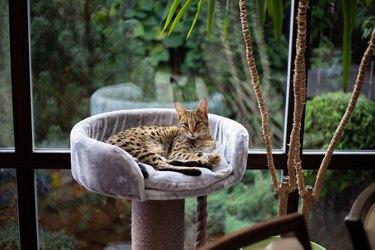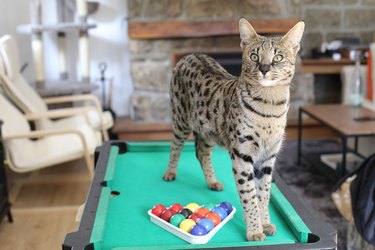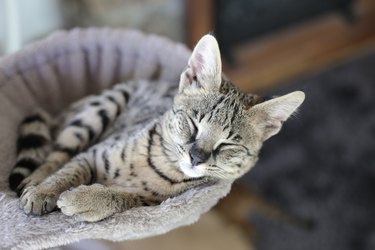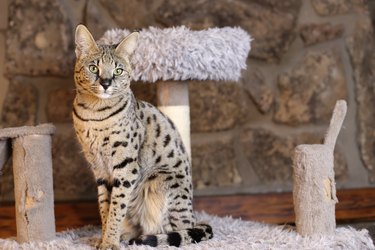
Savannah cat quick facts
Length: 20 - 22 inches
Weight: 15 - 28 pounds. Females tend to be smaller than males. (See Savannah cat history)
Video of the Day
Video of the Day
Lifespan: 12 - 15 years or more
Coat length: Short
Coloring: Brown spotted tabby, silver spotted tabby, black, and black smoke
Grooming needs: Low
Friendliness: Breed alone is not an accurate predictor of individual cats' personalities. However, Savannah cats are generally regarded as confident, outgoing, and loyal.
The Savannah cats still resemble their African serval ancestor. They are large cats with a striking, wild cat appearance. Plus, they are friendly, so they may be a good choice for anyone wishing they had a wild cat — while still enjoying the affection of a house cat. Consider carefully before committing to purchasing a Savannah kitten or cat. They may be a domestic breed, but they are not lap cats. They have a lot of energy that they need to burn off each day. If you enjoy an active cat and can give them the attention they need, then you could be a perfect match.

Savannah cat history
The Cat Fanciers' Association does not recognize the breed and there are some locations within the United States where it is illegal to own this breed as they are still seen as wild cats, despite being classified as domestic animals. Georgia bans the breed completely while Texas requires cat owners to obtain a permit to own the animal. Check your state and local laws before purchasing a Savannah kitten.
Savannah cats are a cross between an African serval and a domestic cat. The African serval is a wild animal native to the continent and is sometimes sold as a cheetah on the black market due to their spotted coat color.
Savannah cats are a fairly new breed with the first Savannah kitten being born on April 7, 1986. This kitten is in the first generation of cats, (also referred to as the F1 Savannah cat) and is one generation away from the wild cat. Savannah cats tend to be the largest with females weighing 13 to 19 pounds, and males weighing 17 to 25 pounds. F1 cats typically grow 16 to 18 inches tall.
The next generations of Savannah are the F2 Savannah generation. They are two generations away from their wild serval ancestor and tend to be a bit smaller. F2 females typically weigh 12 to 16 pounds and male cats weigh between 16 and 25 pounds. They grow 15 to 18 inches tall.
Later generations are referred to as F3, F4, and so on. F3 cats tend to grow 14 to 17 inches tall with females weighing 10 to 13 pounds and males weighing 14 to 20 pounds. F4 and F5 Savannah cats grow 14 to 16 inches tall. Females typically weigh 10 to 13 pounds and males weigh 14 to 20 pounds. The cats tend to be smaller with each generation, but it is possible to see an F5 Savannah cat that is just as large as an F1 Savannah.
The Savannah cat breed is now a domestic cat and has been recognized by the International Cat Association (TICA) since the breed standard, prepared by Patrick Kelly and Joyce Sroufe, was accepted in 2001. TICA granted the breed championship status in 2012.
Savannah cat personality
Savannah cats tend to be friendly, loyal, and love company. However, they are not lap cats and tend to have a high energy level. F1 Savannah cats generally do not tolerate being held and will generally only bond with one or two individuals. F3 Savannah cats and later generations tend to be more sociable and more likely to bond with the family and enjoy being petted.
They are curious and playful and need entertainment and exercise to stay physically and mentally healthy. They have many dog-like tendencies including their desire to be in the same room with family and their enjoyment of walks and games of fetch. Some even enjoy playing in the water. They can also become destructive when they are bored. A Savannah may scratch inappropriately or knock your knick-knacks off of the shelf.
Make sure to have regular playtimes with your cat and consider taking them for walks or taking the time to teach them tricks. In addition, provide entertainment for when you aren't around. This includes options like cat trees and tall areas where they can perch and interactive toys. If you work long hours or are gone for long periods of time for other reasons, consider a second pet to keep the Savannah cat company or opt for a lower-energy breed.

Savannah cat lifespan and health issues
The Savannah cat can live into their mid-teens or even more. As with all breeds, there are some health problems that these cats are prone to. Responsible breeders will test for these conditions whenever possible and stop breeding cats affected with or carrying the genes for these conditions.
Two common health concerns include pyruvate kinase deficiency, a blood disease that causes the breakdown of red blood cells. They can also contract progressive retinal atrophy, a disease that can lead to blindness. Some Savannahs also suffer from hypertrophic cardiomyopathy, a heart condition that causes a thickening of the heart wall. There is not currently a genetic test for this heart disease.
Savannah cat grooming and care
Savannah cats need only occasional brushing. They are shorthair cats but they do have a thick undercoat, so brushing loose fur is necessary, especially when the cat is shedding. As with all cats, make sure you check and clean the cat's ears and trim their nails regularly. Brush their teeth with pet toothpaste.
Feed high-quality cat food as recommended by your veterinarian. Most Savannah cats are extremely active and will need more food than less active cats. Make sure fresh water is available for the cat at all times.

Welcoming a new cat into your home
Due to their high energy and inquisitive nature, it is very important that you kitten-proof or cat-proof your home. Remove any small, breakables from your shelves. Make sure that all the houseplants in your home are non-toxic. Over time, these cats may even learn to open doors, so add appropriate locks or latches on certain rooms and cabinets if necessary. Set up cat trees, window perches, and toys to help your new cat feel at home. Initially, set up your new kitten in a single room with food, water, and a litter box.
Allow your cat to explore on their own terms and approach you when they are ready. Feel free to speak to the cat and offer to play with a teaser toy, but don't force that cat to come to you or be petted against their will. Use positive reinforcement at all times and don't punish your cat if they get into something they shouldn't or behave rambunctiously.
If you have other pets, make the initial introductions through the door. Then, when you allow the animals to be together, supervise the interactions until you are certain they are getting along. Savannah cats are curious and outgoing, so it won't be long before your new cat is an active member of the family.